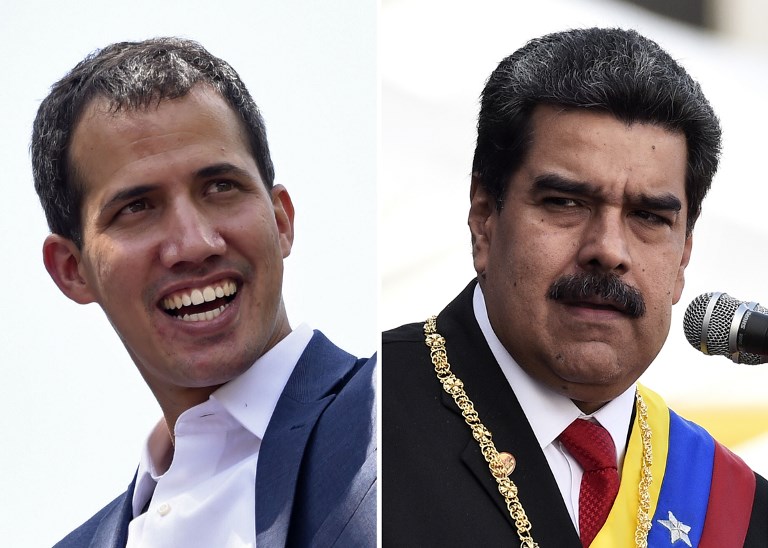
by Roland LLOYD PARRY
Agence France Presse
CARACAS, Venezuela (AFP) — Venezuelan opposition leader Juan Guaido forged ahead Wednesday with plans to bring US medical and food aid into the country in defiance of the military-backed government, raising fears of possible weekend confrontations.
In the latest maneuver of his standoff with socialist President Nicolas Maduro, self-declared interim leader Guaido rallied bus drivers who he said will head to the borders to collect aid for Venezuelans suffering shortages.
Guaido repeated his vow that the supplies would enter “one way or another” — even as Maduro stepped up efforts to block aid he claims is a pretext for a US invasion.
“Even though they point guns at us — and all of us have received threats, rubber bullets and even live ones — we are not afraid,” Guaido said, standing on the back of a truck in a throng of supporters.
“We will stay out in the street with our chests bared, demanding freedom for all of Venezuela.”
Shipments of food and medicine for the crisis-stricken population have become a key focus of the power struggle between Maduro and Guaido, the 35-year-old leader of the Venezuelan legislature backed as acting president by more than 50 countries.
Guaido considers Maduro illegitimate over his reelection last May in polls boycotted by the opposition after several of their leaders were prevented from standing — either jailed, barred or in exile.
He wants to oust Maduro, set up a transitional government and hold new elections.
“This could be very soon, between six and nine months, once Maduro’s current usurpation ends,” Guaido told Mexican television station Televisa.
A million volunteers
Guaido, who says 300,000 people could die without an influx of aid, says he aims to rally a million volunteers to start bringing it in by Saturday.
Addressing supporters he listed the planned transit points of entry at the Brazilian and Colombian borders, the island of Curacao and the seaports of Puerto Cabello and La Guaira.
However the pro-Maduro military has already blocked the Tienditas bridge across the Colombian border, and Vice President Delcy Rodriguez confirmed the government was shutting down air and sea links between Curacao and Venezuela.
The military said in a decree that it was banning vessels from sailing out of Venezuela’s ports until Sunday to avoid actions by “criminal” groups.
Amnesty International’s Americas director Erika Guevara urged authorities to “not only recognize this serious crisis… but also to guarantee access” for those bringing in aid.
Underlining the swell of international support for Guaido, British entrepreneur Richard Branson plans to hold a pro-aid concert just inside Colombia on Friday, while Maduro’s government stages a rival concert on its side of the border, around 1,000 feet (300 meters) away.
US officials say the aid will reach thousands of Venezuelans and last for a few weeks. Further details of how the opposition aims to distribute it were scarce.
Private bus driver Jose Figueroa, 60, said he planned to leave Caracas in the coming days in a convoy of some 30 vehicles.
Foreign ‘aggression’
“The government is leading us to war. It will be very difficult. The situation is extremely tense,” he said, as drivers parked their buses and pick-up trucks at a rally in central Caracas.
“But a bullet will kill you more quickly than hunger.”
Wednesday’s rally gathered just a couple of dozen buses and pick-up trucks in Guaido’s support.
The pro-opposition drivers had planned to hold their rally at a major crossroads further west but found the avenue blocked by a far bigger demonstration.
Hundreds of state bus drivers rallied in the red shirts of the pro-government “Chavismo” movement, in a gathering convened by the authorities.
They yelled their loyalty to Maduro — himself a former bus driver — and the memory of his predecessor, the father of Venezuela’s socialist “revolution,” Hugo Chavez.
State-employed bus driver Julio Arocha, 53, admitted he was “negatively affected” by the crisis, “economically, psychologically”, but was getting by thanks to state food handouts.
Catalyst for change
Like Maduro, Arocha blamed the crisis on foreign “aggression.”
“The aggression is intensifying. The word ‘humanitarian’ is a euphemism,” he said.
Despite sitting on the world’s biggest oil reserves, Venezuela is gripped by an economic and humanitarian crisis, with acute shortages of food and medicine.
“Even if the February 23 deadline does not serve as a catalyst (for regime change), Maduro will likely pay a cost either way,” wrote Eurasia Group analyst Risa Grais-Targow in a note this week.
“Barring the entrance of food and medicine into the country will prompt additional international condemnation and isolation, while it will also probably fuel opposition protests and deepen popular demand for change.”
© Agence France-Presse







